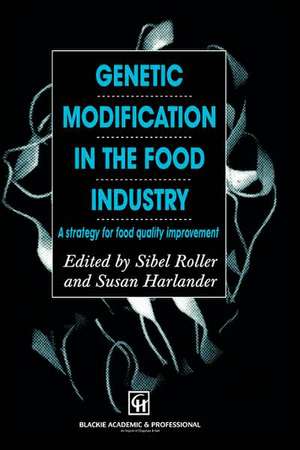Genetic Modification in the Food Industry: A Strategy for Food Quality Improvement
Autor Susan Harlander, Sibel Rolleren Limba Engleză Hardback – 31 iul 1998
| Toate formatele și edițiile | Preț | Express |
|---|---|---|
| Paperback (1) | 639.59 lei 6-8 săpt. | |
| Springer Us – 30 sep 2012 | 639.59 lei 6-8 săpt. | |
| Hardback (1) | 645.28 lei 6-8 săpt. | |
| Springer Us – 31 iul 1998 | 645.28 lei 6-8 săpt. |
Preț: 645.28 lei
Preț vechi: 759.15 lei
-15% Nou
Puncte Express: 968
Preț estimativ în valută:
123.49€ • 134.09$ • 103.73£
123.49€ • 134.09$ • 103.73£
Carte tipărită la comandă
Livrare economică 22 aprilie-06 mai
Preluare comenzi: 021 569.72.76
Specificații
ISBN-13: 9780751403992
ISBN-10: 0751403997
Pagini: 260
Ilustrații: XVI, 260 p.
Dimensiuni: 155 x 235 x 18 mm
Greutate: 0.55 kg
Ediția:1998
Editura: Springer Us
Colecția Springer
Locul publicării:New York, NY, United States
ISBN-10: 0751403997
Pagini: 260
Ilustrații: XVI, 260 p.
Dimensiuni: 155 x 235 x 18 mm
Greutate: 0.55 kg
Ediția:1998
Editura: Springer Us
Colecția Springer
Locul publicării:New York, NY, United States
Public țintă
ResearchCuprins
1 The Broader Issues.- 1 Modern food biotechnology: overview of key issues.- 2 Consumer perceptions of modern food biotechnology.- 3 Moral concerns and the educational function of ethics.- 4 Worldwide regulatory issues: legislation and labelling.- 5 Communicating biotechnology to an uncertain public: the need to raise awareness.- 2 Case Studies.- 6 Food enzymes.- 7 Brewing with genetically modified amylolytic yeast.- 8 Baker’s yeast.- 9 Starter cultures for the dairy industry.- 10 Designer oils: the high oleic acid soybean.- 11 Potatoes.- 12 Cereals.















